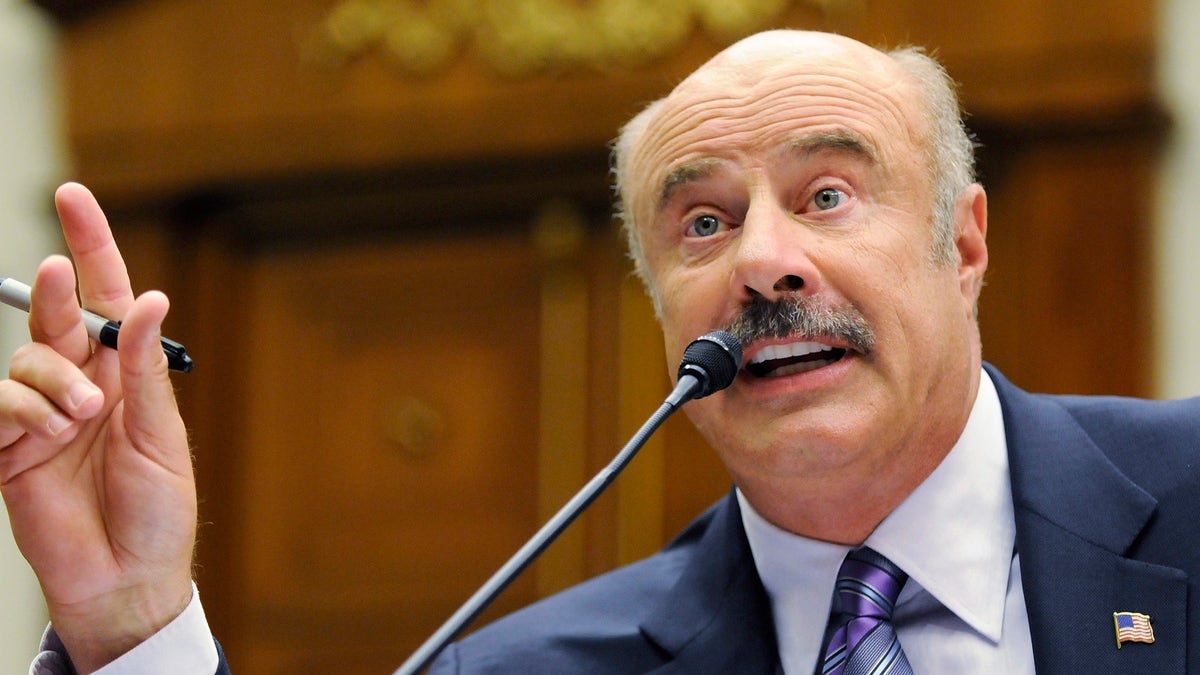
Dr. Phil McGraw, television personality and psychologist, talks about cyber-bullying during a hearing of the Healthy Families and Communities Subcommittee of the U.S. House Committee on Education and Labor, on Capitol Hill in Washington, June 24, 2010. REUTERS/Jonathan Ernst (UNITED STATES - Tags: ENTERTAINMENT POLITICS) - RTR2FOBM (Reuters)
Dr. Phil and his show staff have been accused of procuring drugs and tempting guests with alcohol ahead of show tapings that focused on addiction.
In a scathing expose by STAT and the Boston Globe released Thursday, several former guests accused the TV doctor of egging on their addictions and even helping them acquire drugs.
Dr. Phil, whose real name is Phil McGraw, declined to comment to STAT and the Boston Globe. A rep for the star did not immediately return Fox News' request for comment.
Todd Herzog appeared on the "Dr. Phil" show in 2013. He was battling alcoholism but insists he was not intoxicated when he arrived at the show's studio.
However, the 2007 "Survivor" winner said he discovered vodka in his dressing room, where he was left alone, and proceeded to drink an entire bottle. He alleges he was then offered a Xanax to "calm his nerves" by a show staff member.
Martin Greenberg, a psychologist who is the director of professional affairs for the "Dr. Phil" show, denied Herzog's claim and told STAT and the Boston Globe that guests have never been provided with drugs or alcohol.
Greenberg labeled the claims in the expose "absolutely, unequivocally untrue."
"I had been drinking and took a Xanax, which I've never taken Xanax before in my life, and I know that can be a deadly combination so why it was given to me, I don't know," Herzog said.
Meanwhile, the mother of 28-year-old Kaitlin from Lansing, Mich., alleges a staffer for "Dr. Phil" helped Kaitlin, who was then pregnant, get heroin ahead of her 2016 show taping.
When Kaitlin and her mother, Joelle King-Parrish, arrived in Los Angeles, Kaitlin was going through withdrawal so King-Parrish says she asked a show staff member for help and was told to take Kaitlin to the hospital.
After four hours went by without medical attention, Kaitlin refused to remain at the hospital, and King-Parrish, concerned for Kaitlin's unborn baby's health, asked a show producer for help. King-Parrish claims the show producer joined them and they headed in a cab together to Skid Row.
Kaitlin's excursion to purchase heroin on Skid Row aired on "Dr. Phil." McGraw later scolded King-Parrish on the show for taking her daughter to buy drugs instead of taking her to the hospital.
"There was a lot of manipulation telling us what to say, telling us how to act, telling us what to do," King-Parrish explained. "I was told do not question anything he is saying or he could not give her the help she needed."
Another guest, Jordan, who appeared on the show in 2012 also claimed a show producer told her to "go to Skid Row" to buy heroin.
Jordan and Kaitlin's families told STAT and the Boston Globe the two women are still addicted to opioids. They were sent to rehab following the show, but their families say the treatment was insufficient.
"It was a complete bust," Jordan's aunt Marianne Smith said. "Didn't help at all. Just ratings for him. People are going to him, like us, with serious, life-threatening problems looking for help. It just doesn't happen."
Kaitlin left rehab and Greenberg noted, "The treatment facility is not a locked ward, and she is a hard-core heroin addict. That's what they do."
He said Jordan, like other guests, "had medical supervision" during her time on the show.
But family members of two additional "Dr. Phil" guests said no medical support was provided to them during the time surrounding their show tapings, and one guest claims "Dr. Phil's" staff helped to procure drugs for her.
However, one of Dr. Phil's former guests credits the show with saving her life.
Niki Dietrich was an eight-months pregnant heroin addict when she appeared on "Dr. Phil" last year. She said she was sent to an Origins treatment facility after appearing on "Dr. Phil" and is now sober.
"That was like a miracle," Dietrich said of her experience. "They hooked it up, for sure. The 'Dr. Phil' show, I have nothing bad to say about that experience."
And Greenberg lauded "Dr. Phil" for providing guests with treatment.
"Addicts are notorious for lying, deflecting and trivializing. But, if they are at risk when they arrive, then they were at risk before they arrived," Greenberg stated. "The only change is they are one step closer to getting help, typically help they could not have even come close to affording."


























